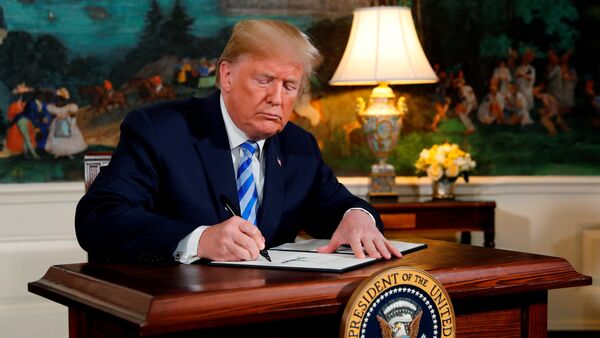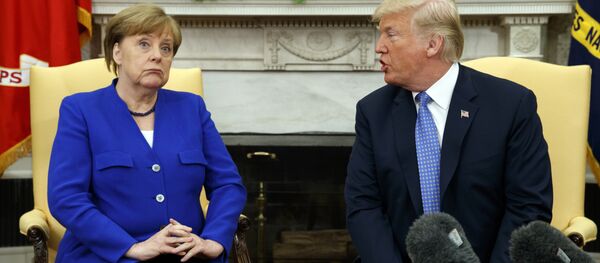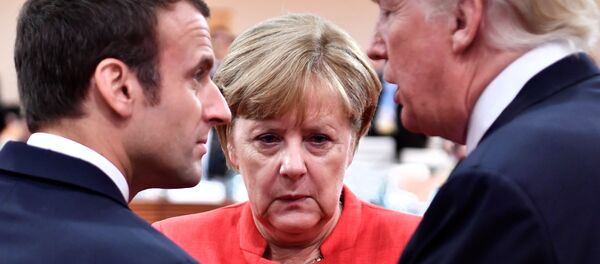By dealing a heavy blow to the 2015 Iran nuclear deal, also known as the Joint Comprehensive Plan of Action (JCPOA), with the subsequent resumption of sanctions the US is actually targeting Beijing, Oleg Matveychev, a political analyst and professor at the Russian Higher School of Economics, told Sputnik China.
"Twenty years ago, when sanctions were imposed on Iran, it was always believed that that would deal a blow to Beijing too," Matveychev said. "Obviously, a blow to Iran always mean a blow to Beijing, because the two are close economic partners. Trade turnover between them amounts to tens of billions of dollars which is very important for [Tehran] amid the US effort to isolate Iran, including economically. Undoubtedly, on the eve of the possible isolation of Iran and the resumption of sanctions… [Tehran] needed to enlist China's support which resulted in [Iranian Foreign Ministry Javad] Zarif's visit to Beijing."
On May 13, Zarif met with his Chinese counterpart Wang Yi in Beijing as part of the Iranian foreign minister's international tour aimed at saving the nuclear agreement. China is one of the P5+1 signatories of the deal.
Following Trump's pullout on May 8, China's Foreign Ministry announced that it remains committed to the JCPOA urging the other signatories to the agreement to follow Beijing's suit.
"China and Iran maintain normal economic ties and trade," said Foreign Ministry spokesperson Geng Shuang. "We will continue with our normal and transparent practical cooperation with Iran on the basis of not violating our international obligations."
"Iran is making every effort to save the deal through diplomatic means," says Yang Danzhi, the assistant director the Chinese Social Sciences Academy's Regional Security Center. "Iranian foreign minister's trip to China and his meeting with Russian, British, French and German officials pursue this very goal."
According to Yang, Tehran attaches special importance to its relations with China: First, Beijing can be trusted; second, China is a permanent member of the UN Security Council. Furthermore, China maintains close ties with Iran in politics, trade and economic cooperation, he added.
"Judging from the position of China's Foreign Minister Wang Yi… China in every way values bilateral relations with Iran, and also hopes that Iran will soon be able to overcome present difficulties," he opined. "For Iran, it is also important that China is eager to make diplomatic efforts to preserve the nuclear agreement."
On the other hand, "China persuades Iran to stick to a peaceful solution while communicating with the international community, to make it feel that Iran's desire to promote regional peace and its adherence to provisions of the Iranian nuclear agreement are sincere," the academic remarked.
According to the Chinese scholar, it's especially important in light of Rouhani's May 8 statement that Iran could restart enriching uranium "without any limitations" within weeks after Trump's withdrawal from the deal.
"This could be seen by the West and the international community as a signal of Iran's resuming the process of creating nuclear weapons," Yang warned. "And if the situation develops this way, the problem of Iran could definitely become more acute. In this context, China considers it necessary to persuade Iran to exercise prudence in its actions."
Meanwhile, on May 14, Zarif held a meeting with Russian Foreign Minister Sergei Lavrov.
"We have planned contacts with all parties to this deal, except for the United States which announced the withdrawal from the agreement, in the coming days," the Russian foreign minister said, stressing that Moscow and a number of other countries have legitimate interests in the Iranian nuclear deal.
Good and substantive meetings with counterparts in Beijing & Moscow; heading to meet with EU High Rep and E3 FMs in Brussels. Will soon determine how P4+1 can guarantee Iran’s benefits under the #JCPOA, and preserve this unique achievement of diplomacy. pic.twitter.com/qH51vd7Dby
— Javad Zarif (@JZarif) 14 мая 2018 г.
Earlier, the UK, France and Germany issued a joint statement expressing regret over Washington's decision to exit the JCPOA and signaled their willingness to remain committed to the accord.
The views and opinions expressed by the contributors do not necessarily reflect those of Sputnik.





